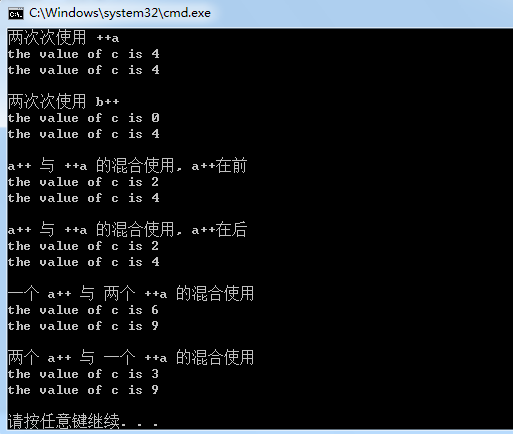i++使用后加1
++i使用前加1
那么 int a=++i + ++i;
是怎么样计算的呢?
++i;
++i;
a=i+i=2+2=4;
而i++是如何计算的呢
a=i++ + i++;
先执行a=i+i;
然后i++;
i++;
让我们看下面的代码
// 例1 #include <iostream> #include <cstdlib> using namespace std; void main() { int c = 0, a = 0, b = 0; cout<<"两次次使用 ++a"<<endl; c = (++a) + (++a); cout<<"the value of c is "<<c<<endl; c = a + a; cout<<"the value of c is "<<c<<endl<<endl; cout<<"两次次使用 b++"<<endl; c = (b++) + (b++); cout<<"the value of c is "<<c<<endl; c = b + b; cout<<"the value of c is "<<c<<endl<<endl; a = 0;//先重新初始化下 变量a cout<<"a++ 与 ++a 的混合使用, a++在前"<<endl; c = (++a) + (a++); cout<<"the value of c is "<<c<<endl; c = a + a; cout<<"the value of c is "<<c<<endl<<endl; a = 0;//先重新初始化下 变量a cout<<"a++ 与 ++a 的混合使用, a++在后"<<endl; c = (a++) + (++a); cout<<"the value of c is "<<c<<endl; c = a + a; cout<<"the value of c is "<<c<<endl<<endl; a = 0;//先重新初始化下 变量a cout<<"一个 a++ 与 两个 ++a 的混合使用"<<endl; c = (a++) +(++a) + (++a); cout<<"the value of c is "<<c<<endl; c = a + a + a; cout<<"the value of c is "<<c<<endl<<endl; a = 0;//先重新初始化下 变量a cout<<"两个 a++ 与 一个 ++a 的混合使用"<<endl; c = (a++) + (a++) + (++a); cout<<"the value of c is "<<c<<endl; c = a + a + a; cout<<"the value of c is "<<c<<endl<<endl; system("pause"); }
执行结果如下图:
